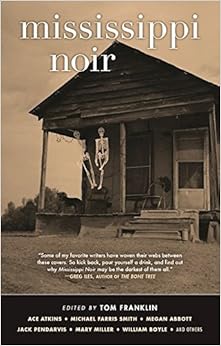"Someone's Moved the Sun," by Jeffrey Siger, in Sunshine Noir, edited by Annamaria Alfieri and Michael Stanley, White Sun Books, 2016.
Toni plays piano in a gay bar on an island in Greece. To pay the bills he (I assume Toni is a he. As near as I can tell, it is not specified) is also an unlicensed private eye. That means he helps tourists and others get stolen property back.
This time his client is a wealthy man named Kleftis who seems to have lost a backpack. What was in it? Cash, certainly. Black market jewelry, very likely. Perhaps something more sinister than that?
Toni thinks he knows who may have done it but there are dangers in proceeding:
Perhaps I could entice one of their local gang members into making a side deal, but that ran the very real risk of someone ending up buried alongside the backpack. Correction: Make that someone me.
A nice modern variation of the classic P.I. tale.
Sunday, October 9, 2016
Sunday, October 2, 2016
The Assassination, by Leye Adenle
"The Assassination," by Leye Adenle, in Sunshine Noir, edited by Annamaria Alfieri and Michael Stanley, White Sun Books, 2016.
I can't tell which African country this is taking place. Probably just ignorance on my part. Otunba is a big businessman and all-around creep. Such a creep, in fact, that someone (maybe many someones) want him dead.
We watch as the net tightens around him, but he doesn't see it. And he just keeps making the world a little worse as he goes his merry way.
This story made my week because of the neat twist ending, which I enjoyed a lot.
I can't tell which African country this is taking place. Probably just ignorance on my part. Otunba is a big businessman and all-around creep. Such a creep, in fact, that someone (maybe many someones) want him dead.
We watch as the net tightens around him, but he doesn't see it. And he just keeps making the world a little worse as he goes his merry way.
This story made my week because of the neat twist ending, which I enjoyed a lot.
Sunday, September 25, 2016
Pandora's Bluff by Gilbert M. Stack.
"Pandora's Bluff," by Gilbert M. Stack, in Alfred Hitchcock's Mystery Magazine, October 2016.
I am very fond of Stack's Western stories about an unlikely trilogy of travelers. Corey is a professional bare fist boxer, brave and strong and kind. Patrick is his manager, more likely to cause trouble than solve it. Neither of them is very bright but the difference is Corey knows it. Their companion is Miss Pandora Parsons, a professional gambler, and she is the brains of the outfit.
This story begins with Miss Parson deep in a poker game somewhere in Idaho. Also playing is a doctor and a banker who wants some land the doctor owns. It's pretty clear what's going to happen, but can Pandora straighten out the mess that follows?
Well, of course she can. The plot is no big puzzle, although her quick-thinking provides a nice twist. The real pleasure of this series is running into these old friends again.
I am very fond of Stack's Western stories about an unlikely trilogy of travelers. Corey is a professional bare fist boxer, brave and strong and kind. Patrick is his manager, more likely to cause trouble than solve it. Neither of them is very bright but the difference is Corey knows it. Their companion is Miss Pandora Parsons, a professional gambler, and she is the brains of the outfit.
This story begins with Miss Parson deep in a poker game somewhere in Idaho. Also playing is a doctor and a banker who wants some land the doctor owns. It's pretty clear what's going to happen, but can Pandora straighten out the mess that follows?
Well, of course she can. The plot is no big puzzle, although her quick-thinking provides a nice twist. The real pleasure of this series is running into these old friends again.
Sunday, September 18, 2016
One Last Job, by Warren Bull
"One Last Job," by Warren Bull, in No Happy Endings, 2016.
This is Bull's second appearance in this blog.
Our hero is a private eye. He survived World War II and has survivor's guilt about that, but he may not have it much longer, because cancer is killing him. A friend offers him one last job: track down a beautiful woman who has gone missing.
He does, but the reason she is being hunted is not any of the reasons you might expect. And before he can decide what to do about that something happens which he actually did expect: a bank robbery. And he and the young woman both have to decide what to do about that.
Snappy dialog between the two main characters. Nice surprise (but not a twist) ending.
This is Bull's second appearance in this blog.
Our hero is a private eye. He survived World War II and has survivor's guilt about that, but he may not have it much longer, because cancer is killing him. A friend offers him one last job: track down a beautiful woman who has gone missing.
He does, but the reason she is being hunted is not any of the reasons you might expect. And before he can decide what to do about that something happens which he actually did expect: a bank robbery. And he and the young woman both have to decide what to do about that.
Snappy dialog between the two main characters. Nice surprise (but not a twist) ending.
Sunday, September 11, 2016
The Way They Do It In Boston, by Linda Barnes
Heightened language. What does that mean?
To me it means the words in the story do something more than get the story from the beginning to the end. They tell you something about the characters or the nature of the universe in which they find themselves.
Here is Barnes' omniscient third-person narrator describing the main character's dog:
Gid got his name in the army. the shredded ear is courtesy of the service as well. the shelter dude said the dog left the service early because he lost his sense of mission, basically went AWOL and played catch with Afghan kids. As soon as she heard that Drew felt a sense of kinship with the dog, a bond. She got blown up and put back together in Iraq. Lost her sense of mission, too, in the desert near Fallujah. The shrapnel in her left leg sets off screaming alarms in airports.
Yeah. Heightened writing.
Drew wants to be a cop in Boston but it's hard to make the resident-for-a-year requirement when you are living in your car with your only friend, a beat-up ex-army dog.
So she's working night security on a tow service parking lot, down by the river. One night a crate of assault weapons washes up on the shore. Something bad is going on. Does it involve the lot? Can she survive long eonough to find out?
Good stuff.
Sunday, September 4, 2016
The Lord of Madison County, by Jimmy Cajoleas
"The Lord of Madison County," by Jimmy Cajoleas, in Mississippi Noir, edited by Tom Franklin. Akashic Press, 2016.
What do you find at the corner of Noir and Southern Gothic? Wicked young ladies, for one thing.
Douglas is a teenager who has come up with the perfect place to sell drugs: his church's youth group. Pastor Jerry loves the kids' ecstatic enthusiasm and doesn't have a clue as to what's going on. He also doesn't know what's going on between his young daughter and Douglas.
But another adult gets Douglas into trouble with his dealer and things, in fine Noir fashion, go to hell. What I love about this story is that it is full of classic Noir characters but you can't predict what will happen based on the standard stereotypes. Some of them go off in surprising directions. Very nice piece of work.
What do you find at the corner of Noir and Southern Gothic? Wicked young ladies, for one thing.
Douglas is a teenager who has come up with the perfect place to sell drugs: his church's youth group. Pastor Jerry loves the kids' ecstatic enthusiasm and doesn't have a clue as to what's going on. He also doesn't know what's going on between his young daughter and Douglas.
But another adult gets Douglas into trouble with his dealer and things, in fine Noir fashion, go to hell. What I love about this story is that it is full of classic Noir characters but you can't predict what will happen based on the standard stereotypes. Some of them go off in surprising directions. Very nice piece of work.
Sunday, August 28, 2016
A Paler Shade of Death, by Laura Benedict
"A Paler Shade of Death," by Laura Benedict, in St. Louis Noir, edited by Scott Akashic Press, 2016.
This may the grimmest story I ever chose as my best of the week. Nothing jolly here, folks.
Becca is moving to a duplex because her husband has a restraining order out against her. Seems she threw some tea cups at him, among other things.
Their son died a few years ago and they have recovered at different paces, which leads to tension. That can happen after a tragedy.
But there are rumors flying around the neighborhood that the child's death was not an accident. And Becca is drinking a lot. Plus there is a little boy who keeps following her around, a few years older than her own son would have been. What's that all about?
I sometimes complain that the editors of the Akashic Noir series forget that it isn't enough just to be depressing; the stories need crime as well. No worries here; Benedict is not afraid to get her characters' hands dirty. If you like your fiction grim, I recommend it.
This may the grimmest story I ever chose as my best of the week. Nothing jolly here, folks.
Becca is moving to a duplex because her husband has a restraining order out against her. Seems she threw some tea cups at him, among other things.
Their son died a few years ago and they have recovered at different paces, which leads to tension. That can happen after a tragedy.
But there are rumors flying around the neighborhood that the child's death was not an accident. And Becca is drinking a lot. Plus there is a little boy who keeps following her around, a few years older than her own son would have been. What's that all about?
I sometimes complain that the editors of the Akashic Noir series forget that it isn't enough just to be depressing; the stories need crime as well. No worries here; Benedict is not afraid to get her characters' hands dirty. If you like your fiction grim, I recommend it.
Sunday, August 21, 2016
Playing the Ace, by Loren D. Estleman
"Playing the Ace," by Loren D. Estleman, in Alfred Hitchcock's Mystery Magazine, September 2016.
This is the second appearance in this space for Estleman and his stories of the Four Horsemen. While it is not a whodunit there are mysteries of a sort that left me pleasantly puzzled. We will get to them.
The Four Horsemen are what remains of the vice squad of the Detroit Police Department during World War II. They are not popular with the bosses but are determined to stay in nice safe Michigan and not get sent to, say Iwo Jima.
In this case they are given the job of bodyguarding a flying ace who is in Detroit on a tour to promote war bonds. Problem is he turns out to not be a very nice person. And that's putting it mildly. So our alleged heroes have to decide what to do about that.
Which brings up my puzzles. If this a crime story, what crime exactly is the subject? And are the Horsemen working for or against the war effort in this affair?
Read it and decide for yourself. You will enjoy it.
This is the second appearance in this space for Estleman and his stories of the Four Horsemen. While it is not a whodunit there are mysteries of a sort that left me pleasantly puzzled. We will get to them.
The Four Horsemen are what remains of the vice squad of the Detroit Police Department during World War II. They are not popular with the bosses but are determined to stay in nice safe Michigan and not get sent to, say Iwo Jima.
In this case they are given the job of bodyguarding a flying ace who is in Detroit on a tour to promote war bonds. Problem is he turns out to not be a very nice person. And that's putting it mildly. So our alleged heroes have to decide what to do about that.
Which brings up my puzzles. If this a crime story, what crime exactly is the subject? And are the Horsemen working for or against the war effort in this affair?
Read it and decide for yourself. You will enjoy it.
Sunday, August 14, 2016
Asleep When Awake, by Duane Swierczynski
This is Swierczynski's second appearance here.
As I have said before, yea, in this very space, you don't need a new plot device to write a terrific story. You can just think of something original to do with an old one.
The idea of two personalities inhabiting one body goes back at least to Robert Louis Stevenson. And that appears to be what's going on.
Gibbs is keeping a journal to try to make sense of what's going on in his life, and maybe in his head. A woman in California invited him to her party so he driving all the way from Philadelphia for the occasion. He has no clue why he would agree to do that.
But someone else writes in the journal too when Gibbs is drunk, and then maliciously destroys the pages...
Is this a simple case of psychosis or is something much more sinister going on?
I can't much more without giving stuff away. It is a satisfactory tale with several twists I did see coming.
Subscribe to:
Comments (Atom)







